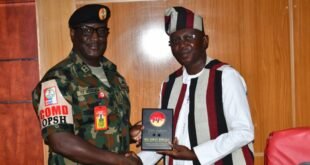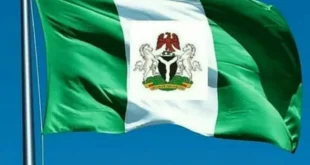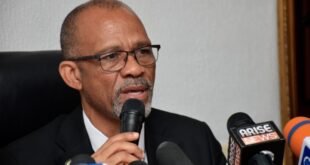Dismantling the false narrative of a “coup d’etat” in the state of sparrows*
By RT Hon Sir Jones Onyereri
The statements according to which the intervention of President Tinubu in the state of the sparrows constitutes an unconstitutional power of power or a “military coup in the civil disguise” that substantially misrepresented the legal, political and security realities that required a federal action. Far from being a partisan maneuver, the declaration of a state of emergency and the subsequent measures were lawful, proportionate and rooted in the imperative to prevent total collapse of governance and public order. Below is a complete refutation to the accusations:
The Nigerian Constitution explicitly authorizes the president to declare an emergency state pursuant to section 305 when there is a clear threat to public security or a breakdown of governance. The escalation of the vandalism of the pipeline by the militants – who paralyzed the economic activity, the extinguishing lives and exacerbated the environmental degradation – coupled with the sentence of the Supreme Court which highlights the failures of governance in the state of the rivers, provided an incontrovertible justification for the federal intervention. The statement that “there was no emergency” ignores the demonstrable inaction of the state government in facing these threats, which risked spiral in a wider violence. The emergency powers are, for design, temporary and exceptional, they aim to restore stability, not to undermine democracy.
The appointment of the IBOK-ETE IBAS admiral as the only administrator aligns with the constitutional provisions for the federal intervention during the crises. Section 11 of the Constitution allows the National Assembly to legislate for a state in extraordinary circumstances and the action of the president enjoys implicit legislative support as a stop button to avoid anarchy. Admiral Ibas, a retired military officer without clear political links, has been selected for his administrative experience, not as a prosecutor for any faction. His mandate is rigorously limited to stabilizing the state, facilitating the return to democratic governance and ensuring that security forces can operate without partisan interference. Equilious this with a “military coup” is hyperbolic and ignores the transparent legal framework that guides its role.
Critics support the challenge of the orders of the Supreme Court regarding state funds, but this erroneously interprets the interaction between judicial mandates and emergency executive authorities. While the Court initially limited the financial flows to the state of the rivers due to the disputes of governance, the escalation of the crisis required the federal release of funds pursuant to the “doctrine of necessity” to support critical services such as health care, education and infrastructure. The Constitution gives priority to the safety and well -being of citizens (section 14 (2) (b)) and the President’s duty to support this principle replaces the rigid adherence to the procedural rules during emergencies.
The actions of the only administrator, including the formulation of the regulations and the renovation of the administrations of the local government, operate within the limits of its provisional mandate. These regulations require approval by the Federal Executive Council (FEC), guaranteeing supervision and responsibility. The replacement of local government officials was not a “power socket”, but a necessary step to dismantle the complicit networks of the diversion of revenue or inefficiency. The insistence of the Supreme Court on local governments elected democratically remains sacrosanct, but intermediate events during emergencies are mechanisms recognized globally to restore functionality before the elections can be organized.
He says that the administrator has passed by preparing a budget or appointing a secretary of the state government (SSG) ignores the practical realities of the government. In the absence of a functional state assembly, temporary budgets based on existing paintings guarantee the continuity of public services. In the same way, the appointment of an SSG – an administrative role of routine – is found within the authority of the administrator to maintain the bureaucratic operations. These measures are neither permanent nor unconstitutional; They are transition tools to prevent total institutional paralysis.
The narrative that this intervention serves the political interests of Minister Wike is speculative and distracts from its declared purpose. The renovation councils and the commissions, including the State Electoral Electoral Commission, aims to decorate the fundamental institutions for the free and Eque elections. Attention to “Wike Lealisti” assumes a nefarious intent without evidence, while the administrator’s appointments could also be reflecting the efforts to involve the expert staff who are familiar with the administrative panorama of the state. The statement that federal actions turn to the allies of the governor Fubara confuse routine responsibility with persecution; In crises, the renovation is inevitable to eliminate inefficiency or prejudice.
As for the reconstruction of the assembly chamber, the federal involvement guarantees that the project adheres to timing and standard, avoiding further delays that could destabilize the legislative functions. The progress of the governor, although commendable, does not deny the need for independent supervision in a volatile environment.
The intervention of President Tinubu is neither indefinite nor authoritarian. The emergency measures will expire once safety and democratic structures are restored. The National Assembly maintains the authority to review and reduce these actions pursuant to section 11, guaranteeing controls and sales. Frame him as “the political acquisition of 2027” is a cynical distortion of a legitimate intervention and necessary to prevent the state of the rivers from going down in the chaos.
In conclusion, the accusations of an “civil couch” or unconstitutional power are not around the constitutional safeguards and the urgent pragmatic considerations that guide federal actions. The President’s duty to protect lives and means of subsistence in the state of spinners transcends the political opportunity. While the supervision against overcoming is prudent, rejecting all stabilization efforts as the partisan machinations undermined the legitimate search for peace and order. The people of the rivers deserve a functional governance, not the perpetual crisis – and the federal intervention, however imperfect, is a constitutional means for this purpose.
RT Hon Sir Jones Onyereri Phd, KSP, Fcipan, writes from Port Harcourt, Rivers State, Nigeria.
 JamzNG Latest News, Gist, Entertainment in Nigeria
JamzNG Latest News, Gist, Entertainment in Nigeria









